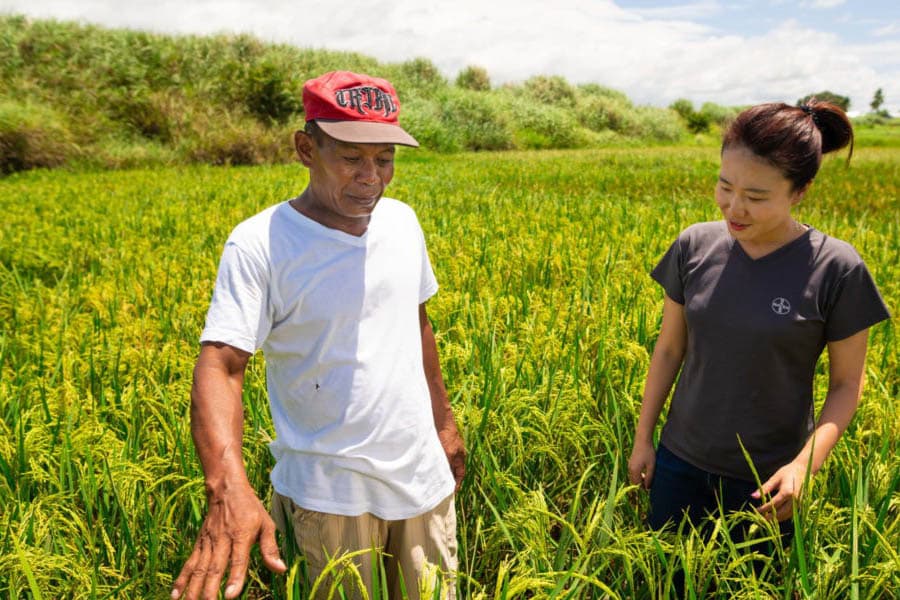Digital technology holds promise to dramatically enhance smallholder productivity and incomes by increasing on-farm and off-farm efficiency, enhancing traceability, reducing vulnerability to counterfeit products, and improving farmers’ access to output, input, and financial markets. The change is driven by the introduction of new forms of intermediation and the collection, use, and analysis of massive amounts of agriculture data to disrupt existing business models. New strategic partnerships in the Democratic Republic of Congo (DRC) between the public and private sectors are an essential component for reaping the positive impacts of digital technology and avoiding unintended and unwelcome secondary effects.

The revolutionary power of digital technology to fuel expansion in DRC
DRC’s agriculture sector is undergoing a digital transformation due to the introduction of cutting-edge instruments and fresh approaches to agriculture. Several stakeholders in the value chain, such as smallholder farmers, now have access to real-time data and computing capacity, allowing for more efficient product-to-market decision-making, loan and insurance supply, and micro-insurance coverage.
It is important to note that network effects are also being created by digital agricultural data, which is driving expansion. By connecting farmers directly to markets, service providers, and aggregators, new business models and e-commerce platforms are made possible by digitization and artificial intelligence, which together with the growing popularity of the sharing economy, boost the profitability of smallholder farming by decreasing the length of the value chain. Smallholder farmers now have easier and more affordable access to agricultural machinery because of the sharing economy, which has a direct impact on crop output.
The advantages are not limited to just higher crop production; Precision farming, agricultural machinery leasing, service provision, and e-commerce are all entrance points for digital technologies in agriculture that might help meet the industry’s most pressing need: recruiting young, ambitious, and job-seeking individuals.
Potential Benefits of using digital technologies
Possible uses for digital technology in farming include:
- Help small farmers take advantage of the rapid rise of e-commerce and the sharing economy by providing them with agricultural machinery sharing apps like Uber;
- Value extraction from agricultural data and the establishment of a network effect as a means to rapid expansion. By automating the supply chain, removing inefficient intermediaries, minimizing food waste, and lowering food costs, the mobile-based e-commerce marketplace platform brings fresh produce to a wider market;
- The transparency gained via the digitization of various operations may increase productivity and cut down on transaction costs;
- Provide a unified mobile platform of digital services for farmers by making market data more widely available. It is a one-stop shop where farmers can get affordable agricultural machinery, financing, educational materials, and market opportunities;
- Foster on- and off-farm employment for the next generation of tech-savvy farmers.
Agricultural Technologies for Smallholder Farmers
Testing technologies in farmer fields was initiated in response to the significant production gap and discovered problems with technology transfer. The development and dissemination of technological advances to the resource-poor farmers of the DRC are hampered by low farmer technology adoption. Yet, double ploughing has only been adopted by a small fraction of farmers because of its reputation for double harvests. Some additional potential technologies that have only been adopted by a minority of farmers include improved crop varieties, integrated pest control tactics, and better crop management practices.
The reliability of DRC’s draft power grid has a major impact on farm incomes. Income from farming was much higher for resource-poor farmers who had access to enough draft power compared to those who did not. Farms that use agricultural machinery and tractors often see more profits than their draft-powered counterparts because of the higher productivity they experience. Farms that used tractors and other farm implements to work had higher average total income, while those who relied on oxen and donkeys saw the lowest. Having access to dependable draft power equipment may boost a farm family’s revenue.
There are several reasons why farmers are hesitant to accept new technology, such as a lack of agricultural machinery, a heavy task, inadequate resources, unpredictable weather, a lack of draft power, a lack of accessible labor, a lack of compatible seeds, or a lack of perceived advantages. Some of the biggest barriers to the adoption of these technologies may be removed if we work with farmers to help them see the benefits of the innovations and if we subsidize the purchase of some of the innovations that resource-poor farmers cannot afford.
Role of Tractors PK
Tractors PK can help the farmers of the Democratic Republic of the Congo save a lot of money on much-needed agricultural machinery while simultaneously increasing the farmers’ ICT literacy via the usage of technologically-based crop information systems. In the same way that Tractors PK may save farmers a ton of money on much-needed agricultural machinery, technology-based crop information systems have the ability to increase farmer literacy and the adoption of innovative agricultural technologies. The smallholder farmers in the DRC feel more secure now that Tractors PK exists. Farmers are hopeful about the project’s prospects because of the abundance of high-quality agricultural machineries available for purchase, such as Massey Ferguson tractors and New Holland tractors, as well as other farm implements like combine harvesters.